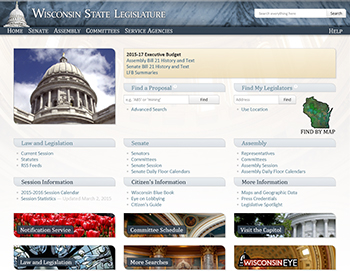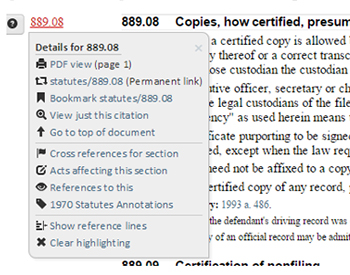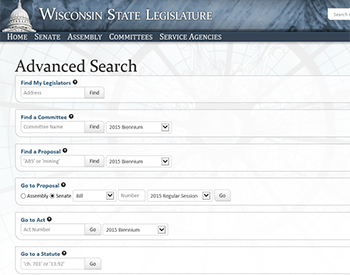April 1, 2015 – Legislation – past, present, and future – is a cornerstone of the law. The State of Wisconsin State Legislature ensures legal researchers have access to this legislative material, and was among the first states to make legislative materials available online.
In August 2014, a redesigned Wisconsin State Legislature website launched. The website boasts more search options, additional information such as links to other service agencies, and accommodates mobile devices.
This article explores the sections and features of the Wisconsin State Legislature page. A general overview of the materials is provided, along with research efficiency tips.
 Homepage
Homepage
Serving as the “dashboard” to all things legislative, the homepage is a well-organized research launching point. Through the homepage, users can quickly locate key items such as specific bills, legislators, and supporting documents. High-interest documents are featured in the highlighted section near the top of the webpage. Currently, 2015-17 Executive Budget materials and Right to Work bills are showcased.
Find a Proposal features a dedicated search box presenting results from the current biennium. Queries entered in this search box can include a specific bill, specific act, or keyword/topic.
Find My Legislators permits users to enter an address or utilize the interactive map to quickly locate both senators and representatives.
The Search box found in the homepage’s upper right-hand corner conducts a comprehensive search of the entire website. For example, a search of “Limited Liability Corporation” produces two sets of results. The first set includes items from the various legislative entities such as the Legislative Audit Bureau, Legislative Fiscal Bureau, Legislative Reference Bureau, or Legislative Council. The second set lists legislative documents. Choosing “view more results” at the bottom of the search list further enhances the search by permitting filtering by document type and biennium. Having a significant number of filter options helps quickly locate materials of interest.
Another useful link on the home page is entitled Service Agencies. Often when conducting a legislative history, searchers look beyond the Wisconsin State Legislature’s website. This menu option quickly connects to the other agency (e.g. LAB, LFB, LRB) websites.
An often-overlooked resource is the Help or FAQ page containing answers to many questions about the Legislature. Web page currency is just one subject discussed: “New bills, resolutions and amendments are added within 30 minutes of publication. Bill status and histories are updated overnight. Other documents are updated as information changes, or following the schedule of a print publication.”
 Another valuable guidance is the document specific help page. It includes tips on creating successful queries using phrase searching, Boolean searching, and limiting results.
Another valuable guidance is the document specific help page. It includes tips on creating successful queries using phrase searching, Boolean searching, and limiting results.
Researchers will often see a question mark button throughout the search process. Clicking on the question mark will provide a few additional navigational, format, and information options.
When searching statutes, the question mark links to cross references and Acts affecting the section (current session only). These documents are often a key to building an understanding of a statute section.
Law and Legislation
The Law and Legislation link is arguably the most valuable link for legal researchers. The set of documents located on this webpage serve as a stepping stone to conduct current and historical legislative research.
At the heart of the Legislature's web site lie the Wisconsin Statutes & Annotations, including the Wisconsin Constitution. Browsing and finding aids include a table of contents, subject index, cross references, a list of sections affected by acts, and a search engine. Keyword searching of the statutes groups results by chapter. Enclosing phrases in quotation marks, such as “urban rail transit,” helps increase search precision.
 Bev Butula is the manager of library of services at Davis & Kuelthau, Milwaukee. She is a past president of the Law Librarians Association of Wisconsin. Butula has written articles and spoken to numerous groups on issues such as effective Internet research, evaluation of websites, and legal research. Prior to obtaining her Master’s Degree in Library Science from UWM, Butula was a litigation paralegal.
Bev Butula is the manager of library of services at Davis & Kuelthau, Milwaukee. She is a past president of the Law Librarians Association of Wisconsin. Butula has written articles and spoken to numerous groups on issues such as effective Internet research, evaluation of websites, and legal research. Prior to obtaining her Master’s Degree in Library Science from UWM, Butula was a litigation paralegal.
 Laura Olsen is the Legal Research Operations Specialist at Quarles & Brady LLP in Madison. A 22-year law library veteran, Olsen conducts legal research, advises attorneys and other researchers on legal research methodology, and evaluates and implements cost-effective legal research information solutions.
Laura Olsen is the Legal Research Operations Specialist at Quarles & Brady LLP in Madison. A 22-year law library veteran, Olsen conducts legal research, advises attorneys and other researchers on legal research methodology, and evaluates and implements cost-effective legal research information solutions.
Butula and Olsen are members of the Law Libraries Association of Wisconsin (LLAW), a chapter of the American Association of Law Libraries (AALL). LLAW's Public Relations Committee coordinates regular contributions by its members to InsideTrack.
Statutes are available in both HTML and PDF format. Per Wis. Stat. section 35.18(2)(b), the electronic version is certified, and is prima facia evidence under Wis. Stat. section 889.01. E-book versions of the current Statutes and Annotations are available for download. For a review of the statutes e-book, see the April 2, 2014, InsideTrack article, Wisconsin Statutes eBook Updates Improve Functionality and Usability.
The Wisconsin Administrative Code contains rules promulgated by administrative agencies under the authority of the statutes, and is arranged by administrative agency The online archive features code text inserted and removed from January 1956 to the present. The Code is available in both HTML and PDF format and is updated on the first of each month. Warnings are included in all chapters affected by Emergency Rules; however, this displays only in the HTML version of the code. Finding aids include a table of contents, subject index, and cross references to other code sections.
The Wisconsin Administrative Registeris the official publication communicating updates and modifications of the Wisconsin Administrative Code. The Register is published each Monday in electronic format. Prior to 2015 the Register was a bimonthly publication available both electronically and in print. Other available administrative materials include emergency rules, clearinghouse (active) rules, and related information about their history and status.
Wisconsin's online legislative archive is far more extensive than that of many other states. The laws archive features links to historical versions of the constitution dating back to 1989, statutes to 1941, acts dating to statehood in 1848, and territory acts to 1836. The districts section provides information on senate and assembly districts, maps, and legislator information. The session archive aggregates pertinent legislative documents by session, including proposals, amendments, drafting files, records of public hearings, and senate and assembly journals. The Legislative Council archive offers memos summarizing amendments and acts dating to 2003.
Drafting files, also known as drafting records, serve as the official, administrative records of the bill drafting process. Drafting records may yield information on legislative intent. The archive features the drafting files dating back to 1999; records from 1927 to 1997 are available on microfiche at the Legislative Reference Bureau.
Often overlooked is the 1970 edition of Wisconsin Annotations. The current statutes provide annotations dating back to 1971-72 session; the 1970 edition provides the annotations prior to 1971. Section histories, interpretative notes, and information relating to court decisions, attorney general's opinions, and published articles are covered in the annotations. Annotations are an important link in gaining a holistic understanding of a statute and its interpretation.
Key documents for the legislative session are organized under the heading of the same name. Review the text of introduced proposals, amendments, acts, veto messages, votes, and other documents. Researchers can review all relevant information for the biennium from this single location.
An instrumental tool for researching current and historical legislative materials is the Index to the Bulletin of Proceedings. Wisconsin Brief 13-8, Researching Legislative History in Wisconsin, a must-read for those who conduct legislative history research, defines the Index as “a detailed subject index of all legislation introduced during a biennial session. Since the mid-1970s, the Index has included more detailed information for budget bills, indicating which sections of the bill relate to a particular subject heading in the Index, and which amendments created which sections of the bill under a particular subject heading.” Current and historical indices are available.
Items found under Miscellaneous Documents include executive orders, Wisconsin Supreme Court rules, opinions of the Attorney General, and town law forms. The organization and coverage of these materials vary by collection. For example, the executive orders are organized by Governor going back to Governor Knowles. The Legislative Reference Bureau maintains an excellent subject index to the executive orders.
Attorney General Opinions are currently available from 1984 forward. Researchers will appreciate the index to the AG opinions also available on the website.
Another overlooked resource is the town law forms. Town law forms are a set of sample forms and ordinances that correlate to specific Wisconsin statutes.
Senate and Assembly
Gain insight into Senate and Assembly members and their respective committees via the Assembly and Senate links on the homepage. Select a legislator’s individual website for biographical information, sponsored legislation, press releases, and, occasionally, information on issues of particular interest to the legislator. As an example, Sen. Lasee provides documentation on his wind turbine efforts.
Select the details link to launch the standard web page for each legislator. Access general information and the ability to establish RSS feeds to both authored proposals and related items specific to that legislator.
Anyone monitoring the current session will find the Session (Calendar and Video) links valuable. Quickly access the agenda, links to resolutions, and a summary of what occurred during each session. Video, via Wisconsin Eye (see later section), is also available.
Committees represent a vital component of the Legislature. Researchers can connect to these committees from the Senate and Assembly webpages. Useful information can be found on each committee’s page including the name of the committee clerk’s name, links to items currently “in” committee, items “out” of committee, committee members, upcoming meetings, and the ability to set up an RSS feed, or receive email notifications specific to that committee.
Citizen’s Information
The citizen’s information section includes links to three tools to advise and support an informed citizenry. The Wisconsin Blue Book, published biennially, is a source for information about the people and state of Wisconsin. Published for more than 150 years, the Blue Book details the framework of state government, the three branches of government, state political parties and elections, and includes valuable statistical tables.
The Government Accountability Board's Eye on Lobbying resource allows users to search and determine who is lobbying, what are they lobbying about, as well as the lobbying efforts of principals. The site is a one-stop-shop for all things related to state lobbying information and disclosure.
The Legislative Council's A Citizen's Guide to Participation in the Wisconsin State Legislature helps citizens participate in the legislative process by providing information on the legislature, legislative documents, legislators, testifying at hearings, plus a glossary of legislative terms.
More Information
Legislative Spotlight located in the More Information section is a weekly publication of the LRB. This online publication offers researchers a succinct look at the Legislature’s week, an excellent means to catch up, or the ability clarify issues. An archive of these updates is available from 1997 forward.
Maps and Geographic Data, another resource within this section, is maintained by the Legislative Technology Services Bureau. This page provides researchers with mapping, interactive, and visual data. Files located in this section vary in format so may not be accessible to all researchers.
Several items found in the Maps Collection may be of interest such as Wisconsin counties, municipalities, ward maps, and election data. Individuals researching redistricting will find a set of valuable resources on the Maps and Geographic Data page. Links direct to redistricting statutes, legislation, a glossary, timetable, and additional resources.
Staying Current Using the Wisconsin Legislative Notification Service and RSS Feeds
The Wisconsin Legislative Notification Service is a push-technology tool that enables users to monitor legislative proposals and committee activities and receive email updates. New in January 2015 is the addition of Wisconsin Administrative Code and Register content to the notification tool. The system allows users to create legislative alerts based on subject, key words, bill number, committee name, or bill author, plus administrative alerts for new Register issues and modified code chapters. Automated tracking greatly simplifies the time-consuming process of monitoring the status of multiple bills, subjects, committees, and code chapters. A single daily e-mail digest aggregates the updates, providing information on new or changed content.
RSS Feeds are another current awareness tool offered by the Legislature. RSS, or Really Simple Syndication, allows users to be notified when selected websites have been updated. Use of RSS feeds eliminates the need to manually check websites for new content. Wisconsin legislative sources covered via feeds include the statutes, administrative rules, plus session-specific information including introduced proposals, committee actions, and floor actions.
Committee Schedule
The committee schedule is available in both calendar and list view, and provides links to underlying notices. A filter is used to display schedules for selected committees.
 More Searches
More Searches
A hidden gem is the advanced search template under More Searches. This is an option for known queries.
The researcher enters the needed information into the appropriate search box and, where applicable, selects a Biennium or legislative session from 1995 forward.
Cameras in the Chambers: Wisconsin Eye
An informed and engaged citizenry is a critical component in a successful democracy. Wisconsin Eye helps ensure citizens have audio and video access to the Legislature's proceedings, as well as those of the Wisconsin Supreme Court. Cutting-edge robotic cameras provide full, unedited coverage of state proceedings, offering both live and archived video streaming. Live access is also available by through digital cable systems. Wisconsin Eye is a not-for-profit entity, privately financed without state funding, providing editorially independent and nonpartisan coverage.
Use Wisconsin Eye to view live or archived senate and assembly floor sessions, committee meetings, Wisconsin Supreme Court oral arguments, plus special events and series.
Archival coverage dates back to the 2007-08 legislative biennium. Search capabilities enable the user to locate archived content by keyword, date, name, organization, or legislative proposal number. If your eye is on the activities of the Wisconsin legislature, look no further than Wisconsin Eye for gavel-to-gavel coverage.
Conclusion
Wisconsin continues to offer comprehensive coverage of both current and historic legislative materials. The Wisconsin State Legislature website is the link to this material. Clearly organized and user friendly, it is a valuable resource for legal researchers.
